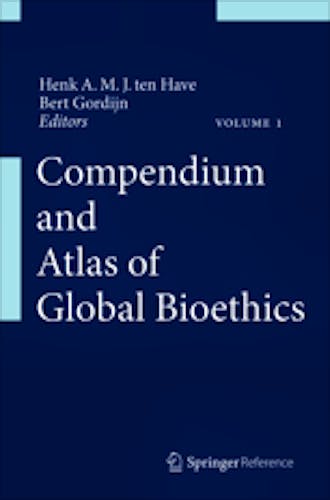

No hay productos en el carrito



Compendium and Atlas of Global Bioethics, 4 Vols.
ten Have, H. — Gordijn, B.
1ª Edición Noviembre 2013
Inglés
1685 pags
4700 gr
16 x 24 x null cm
ISBN 9789400725119
Editorial SPRINGER
ABOUT THIS BOOK
· First comprehensive survey of global bioethics in specific countries
Describes and analyses of bioethics in approximately 50 countries
· Focuses on institutionalisation and the most important state of the
art discussions emerging and topics in the field
· Provides a unique global perspective facilitating comparison of the
state of bioethics in various countries
· Gathers a renowned global group of international authors
As the first of its kind, this handbook presents state-of-the-art information
and analysis concerning the state of affairs in bioethics in approximately 50
countries.
The country reports point out the most important discussions as well as the emerging topics in the field. Readers can orientate themselves quickly as regards the various relevant issues, institutional structures and expertise available in these countries.
The authorship of this reference work is truly global as it involves contributions from the best authors with innate knowledge of the bioethics situation in these countries.
Content Level » Research
Keywords » Ethics - Global bioethics - Globalization - Medical ethics
- Research ethics
Related subjects » Applied Ethics & Social Responsibility - Epistemology
& Philosophy of Science - Medicine
TABLE OF CONTENTS
Compendium and Atlas of Global Bioethics Volumes 1 and 2; Section 1: Introduction Global Bioethics History of Global Bioethics Structure of the Compendium Section 2: Principles of Global Bioethics Human dignity and human rights.- Benefit and harm Autonomy and individual responsibility.- Consent Persons without the capacity to consent.- Respect for human vulnerability and personal integrity.- Privacy and Confidentiality Equality, justice and equity.- Non-discrimination and stigmatization Respect for cultural diversity and pluralism.- Solidarity and cooperation Social responsibility and health Sharing of Benefits Protecting future generations.- Protection of the environment, the biosphere and biodiversity.- Section 3: Cultural Perspectives African perspectives Arab perspectives Asian perspectives European perspectives.- Latin American perspectives.- North American perspectives.- Pacific perspectives.- Section 4: Religious Perspectives.- Buddhism.- Catholicism.- Confucianism.- Hinduism.- Islam.- Judaism.- Orthodox.- Christianity.- Protestantism.- Taoism.- Section 5: Specific Issues from a Global Perspective.- Bioethics education.- Bioethics committees.- Bioethics and human rights.- Biopiracy.- Biobanking.- Biometrics.- Clinical research in resource-poor settings.- Codes of conduct.- Commodification of human tissue.- Corruption.- Disasters.- Disease mongering.- Dual use.- Emerging technologies.- Enhancement.- Fair trade.- Genetic modification.- Human cloning.- Immigrants and displaced persons.- Indigenous medicine.- Informed consent.- Malnutrition and hunger.- Migration of health personnel and brain drain.- Nanotechnology.- Neurotechnology.- Organ trafficking and transplant tourism.- Poverty.- Public health.- Publication ethics.- Research.- Research and traditional medicine.- Scientific misconduct and research integrity.- Sports.- Synthetic biology.- Section 6: Future Perspectives.- Future Perspectives.- Volumes 3 and 4 Section 7: Countries.- Argentina.- Australia.- Austria.- Botswana.- Brazil.- Bulgaria.- Burkina Faso.- Cameroon.- Canada.- China.- Colombia.- Congo.- Dem Rep.- Côte d’Ivoire.- Croatia.- Denmark.- Dominican Rep.- Egypt.- Ethiopia.- France.- Gabon.- Gambia.- Germany.- Ghana.- Guinea.- Iceland.- India.- Indonesia.- Iran, Islamic Rep.-Israel.- Italy.- Japan.- Kazakhstan.- Lebanon.- Lithuania.- Madagascar.- Malawi.- Malta.- Mexico.- Netherlands.- New Zealand.- Nigeria.- Norway.- Pakistan.- Philippines.- Portugal.- Qatar.- Saudi Arabia.- Singapore.- Slovakia.- South Africa.- Spain.- Sri Lanka.- Switzerland.- Syrian Arab Rep.- Togo.- Turkey.- Ukraine.- USA.
AUTHORS & EDITORS
Bert Gordijn is Chair of Ethics and Director of the Ethics Institute at Dublin City University. He has studied Philosophy and History at the Universities of Utrecht (Netherlands), Strasbourg (France) and Freiburg in Breisgau (Germany). In 1995 he was awarded a doctorate in Philosophy; in 2003 he received a doctorate in Bioethics. He was a Visiting Research Fellow at the Centre for Economic and Social Aspects of Genomics at Lancaster University (UK), the Center for Clinical Bioethics at Georgetown University (USA) and the Fondation Brocher (Switzerland). Bert is Editor-in-Chief of the academic book series The International Library of Ethics, Law and Technology (published by Springer). In addition he is Editor-in-Chief of two peer reviewed journals: Medicine, Health Care and Philosophy (also published by Springer) and Studies in Ethics, Law and Technology (published by Berkeley Electronic Press). Bert has been appointed to the Scientific Advisory Board of the European Patent Organization, the External Science Advisory Panel to the Long-Range Research Initiative of the European Chemical Industry Council and has served on the UNESCO expert committee on ethics and nanotechnology.Henk ten Have studied medicine and philosophy at Leiden University, the Netherlands. He received his medical degree in 1976 from Leiden University and his philosophy degree in 1983. He worked as a researcher in the Pathology Laboratory, University of Leiden (1976-1977), as a practicing physician in the Municipal Health Services, City of Rotterdam (1978-1979), and as a Professor of Philosophy in the Faculty of Medicine and Faculty of Health Sciences, University of Limburg, Maastricht (1982-1991). From 1991 he was a Professor of Medical Ethics and the Director of the Department of Ethics, Philosophy and History of Medicine in the University Medical Centre, Nijmegen, the Netherlands. In September 2003 he joined UNESCO as Director of the Division of Ethics of Science and Technology. In 2010 he was appointed as Director of the Center for Healthcare Ethics, Duquesne University, Pittsburgh.
© 2025 Axón Librería S.L.
2.149.0